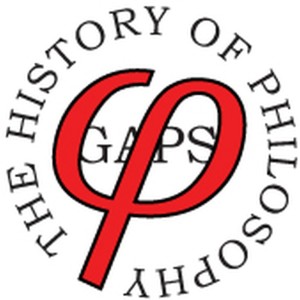Episodes

Sunday Apr 13, 2025
HoP 467 Written in Mathematics: Descartes’ Physics
Sunday Apr 13, 2025
Sunday Apr 13, 2025
For Descartes body is purely geometrical. So how does he understand features we can perceive, like color, and causation between bodies?

Sunday Mar 30, 2025
HoP 466 Well Hidden: Descartes’ Life and Works
Sunday Mar 30, 2025
Sunday Mar 30, 2025
How René Descartes’ understanding of his own intellectual project evolved across his lifetime.

Sunday Feb 16, 2025
HoP 463 Doctors without Borders: the Republic of Letters
Sunday Feb 16, 2025
Sunday Feb 16, 2025
How scholars around Europe created an international network of intellectual exchange. As examples we consider the activities of Mersenne, Peiresc, Leibniz, Calvet, and Hartlib.

Sunday Jan 19, 2025
HoP 461 - Eileen Reeves on Galileo and the Telescope
Sunday Jan 19, 2025
Sunday Jan 19, 2025
We finish our look at philosophy in the Reformation era with an interview about Galileo's use of a revolutionary technology: the telescope.

Sunday Jan 05, 2025
HoP 460 - Trial and Error - Galileo and the Inquisition
Sunday Jan 05, 2025
Sunday Jan 05, 2025
The philosophical issues at the heart of the notorious condemnation of Galileo and Copernican astronomy.

Sunday Dec 22, 2024
HoP 459 - Cardinal Rule - Robert Bellarmine
Sunday Dec 22, 2024
Sunday Dec 22, 2024
Though most famous for his role in persecuting Galileo, Robert Bellarmine was a central figure of the Counter-Reformation, especially in his political thought.

Sunday Nov 24, 2024
HoP 457 - Take Your Medicine - Oliva Sabuco and Camilla Erculiani
Sunday Nov 24, 2024
Sunday Nov 24, 2024
Natural philosophy and medicine in the work of two unorthodox thinkers of the late sixteenth century, both of them women.

Sunday Jan 21, 2024
HoP 437 - Jennifer Rampling on Renaissance Alchemy
Sunday Jan 21, 2024
Sunday Jan 21, 2024
An expert on Renaissance alchemy tells us how this art related to philosophy at the time... and how she has tried to reproduce its results!

Sunday Jan 07, 2024
HoP 436 - Unpathed Waters, Undreamed Shores - Robert Fludd
Sunday Jan 07, 2024
Sunday Jan 07, 2024
Our last figure of the English Renaissance undertakes daring investigations of chemistry, medicine, agriculture, and cosmology – and gets accused of magic and Rosicrucianism.

Sunday Dec 24, 2023
HoP 435 - Metal More Attractive - William Gilbert and Magnetism
Sunday Dec 24, 2023
Sunday Dec 24, 2023
The cosmological and methodological implications of breakthroughs in the understanding of magnetism and electricity at the turn of the 17th century.

Sunday Dec 10, 2023
HoP 434 - The Eye Sees Not Itself But By Reflection - Theories of Vision
Sunday Dec 10, 2023
Sunday Dec 10, 2023
Changing ideas about eyesight, light, mirror images, and refraction – and the skeptical worries they may have inspired.

Sunday Nov 26, 2023
HoP 433 - Nature’s Mystery - Science in Renaissance England
Sunday Nov 26, 2023
Sunday Nov 26, 2023
How scientists of the Elizabethan age anticipated the discoveries and methods of the Enlightenment (without necessarily publishing them).

Sunday Dec 18, 2022
HoP 410 - Ann Blair on Jean Bodin’s Natural Philosophy
Sunday Dec 18, 2022
Sunday Dec 18, 2022
A chat with Ann Blair about the "Theater of Nature" by Jean Bodin, and other encyclopedic works of natural philosophy.

Sunday Sep 11, 2022
HoP 403 - Make It Simple - Peter Ramus
Sunday Sep 11, 2022
Sunday Sep 11, 2022
Peter Ramus scandalizes his critics, and thrills his students and admirers, by proposing a new and simpler approach to philosophy.

Sunday Jul 31, 2022
HoP 402 - Life is Not Enough - Medicine in Renaissance France
Sunday Jul 31, 2022
Sunday Jul 31, 2022
Challenges to Galenic medical orthodoxy from natural philosophy: Jean Fernel with his idea of the human’s “total substance,” and the Paracelsans.

Sunday May 08, 2022
HoP 396 - Lorraine Daston on Renaissance Science
Sunday May 08, 2022
Sunday May 08, 2022
Comets! Magnets! Armadillos! In this wide-ranging interview Lorraine Daston tells us how Renaissance and early modern scientists dealt with the extraordinary events they called "wonders".

Sunday Apr 24, 2022
HoP 395 - Music of the Spheres - Johannes Kepler
Sunday Apr 24, 2022
Sunday Apr 24, 2022
Johannes Kepler fuses Platonist philosophy with a modified version of Copernicus’ astronomy.

Sunday Apr 10, 2022
HoP 394 - Best of Both Worlds - Tycho Brahe
Sunday Apr 10, 2022
Sunday Apr 10, 2022
Responses to Copernicus in the 16th century, culminating with the master of astral observation Tycho Brahe.

Sunday Mar 27, 2022
HoP 393 - The World Doesn’t Revolve Around You - Copernicus
Sunday Mar 27, 2022
Sunday Mar 27, 2022
How revolutionary was the Copernican Revolution?

Sunday Jan 30, 2022
HoP 389 - The Acid Test - Theories of Matter
Sunday Jan 30, 2022
Sunday Jan 30, 2022
Schegk, Taurellus, Gorlaeus, and Sennert revive atomism to explain chemical reactions, the composition of bodies, and the generation of organisms.

